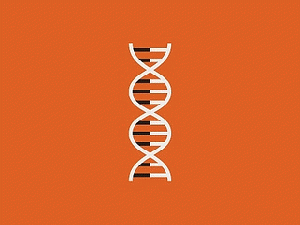For better and for worse.
Dribbble - DNA by Linda Eliasen - Designspiration - Popular by michael.boston
The English language in which Beowulf was written is a far cry from the English language of today. Nonetheless, we can readily understand the speeches of Washington and Lincoln. A century from now, Americans will still be speaking a recognizable English language, transmitted through our children and grandchildren to their children and grandchildren.
The phrase that captures this ability of culture to replicate itself from generation to generation--often across many centuries--is "the persistence of culture."
And as with the transmission of DNA, there is much that is beneficial about this preservation, from generation to generation, of the patterns of culture.
In terms of our present concern --our ability to choose our future--the first and main point to be made about the way cultures transmits their patterns is that it represents a powerful stabilizing force. It is less a force --like that described in The Parable of the Tribes and that in The Illusion of Choice --that pulls us off course than an anchor that keeps us on a course.
As an anchor, it can be a problem, acting as an obstacle to our moving into the future we might most desire because it sets limits on our ability to change.
But there is also another way that the "transmission of culture" is more complicated, and will illuminate that "mystery magnet" that we'll be getting to soon.
Regarding the first point --cultural transmission as resistant to change, for better and for worse--here's one vivid example:
In the north of New Mexico, it was discovered in our times that there were people who still lit candles every Friday evening at sundown, but had absolutely no idea why they did it. But their parents had done it. It turns out, of course, that these people are the descendants of Jews from Spain or Mexico who were compelled to conceal their Jewish observance and to maintain the pretense of being Christian. So, three and a half centuries later, their descendants --good Catholics by now, I guess-- are still lighting candles on Friday evenings.
Here's another, with more profound ramifications. For many centuries, China was the dominant civilization in the world in which it operated. The experience of this power and status generated in the culture --in the minds of its people--and image of Chinese civilization as the Center of the World, the Middle Kingdom, superior to everything they saw around them. What is amazing, in terms of the persistence of culture, is how that feeling survived in China even through many, many generations of disintegration, and humiliation, and subordination to foreign powers. The idea remained, ready to reassert itself.
The story of China also shows how this persistence of culture can provide continuity even despite efforts to effect a drastic change of course.
The Chinese revolution, led by Mao Tse-Teng attempted to extirpate, root and branch, much of Chinese tradition. But analysts of Communist China back in the reign of Mao noted how profoundly Confucian, in many ways, was his way of ruling.
Societies and cultures and peoples have a powerful tendency to remain what they are.
(Note: You can view every article as one long page if you sign up as an Advocate Member, or higher).






